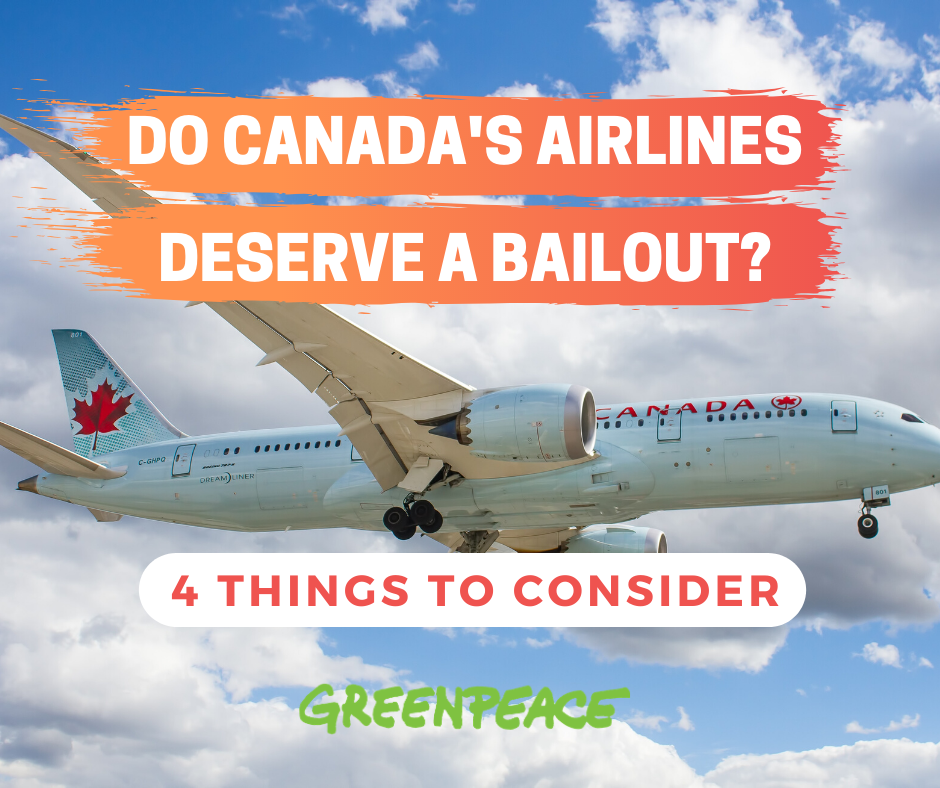
Flying is part of our lives — for work, holiday and an all-important life-line to family members across the country or around the globe. But greenhouse gas (GHG) emissions from the aviation sector are creeping up in Canada and globally.
So how do we balance international mobility and climate action?
Yes, we need to reduce airline travel in our personal or work lives if we are frequent flyers (or perhaps embrace a frequent levy, as our colleagues in the UK have suggested), but that personal change has to be matched with systemic change.
Canada’s hard-hit airlines are still clamouring for a bailout but have been reticent to make changes needed to do their fair share of mitigating the climate crisis.
Airlines are already eligible for federal employee wage support, rent relief and perhaps emergency loans. Yet, in the face of climate conditions attached to such loans, they continue to be outspoken critics of the federal carbon tax (the kind of policy measure on which economists from across the political spectrum agree can help fight climate change). Instead, airlines argue they can cancel out the cost of their emissions with offsets (which are notoriously unreliable).
When it comes to a federal airline bailout, here are 4 systemic issues to keep in mind:
1. Climate change and decarbonization
Airlines need to cut their emissions to meet globally agreed climate targets. Any bailout should include conditions to support decarbonization, including binding yearly carbon reductions and business plans in line with limiting planetary warming to 1.5 degrees Celsius.
Canada’s airlines have asked for a suspension of carbon taxes on aviation fuels, which Greenpeace opposes. Now is not the time to pause action on the climate emergency. Instead, stimulus packages should help mitigate the impacts of COVID-19 and build climate resilience. Great leaps toward decarbonization are possible. For example, in December last year, a Canadian airline launched the world’s first all electric-powered commercial flight!
2. Keep public money out of shareholder and executive pockets
To prevent public money from being funnelled into the pockets of shareholders, dividend payments must be suspended for any companies being bailed out. Austria, for example, has set a binding but limited one-year ban on the payout of dividends. There should also be a cap on executive pay. In the medium term, the government should ensure the corporate tax regime for airlines is truly fair and explore how additional revenues can be raised to invest in zero-carbon transport options.
3. Protect airline employees
Workers should be protected. That means there can be no pay cuts or lay-offs for any companies benefitting from federal pandemic financial support. It is essential that no aviation sector worker is put into further hardship in these challenging times: the public purse can and must support people working in the airline industry, to avoid the loss of thousands of people’s immediate incomes and their economic security.
4. De-growth: Building back better means cleaner transportation
The demand for air travel is growing and airlines are facilitating that growth. But the current crisis should be the start of a just and sustainable transition for the transportation sector. We need to face the reality of de-growth in the aviation sector, along with other carbon-intensive industries. Translation: we need to fly less and invest in cleaner transport networks, including more efficient trains, ferries and inter-modality where short-haul travel is concerned. Additionally, a substantial just transition fund should be set up to support things like the re-skilling of workers, which should be done alongside trade unions in a just manner.
Want more info? Check out the Greenpeace European Unit list of just transition demands for the aviation sector and their airline bailout tracker to learn how other countries are handling the sector.
